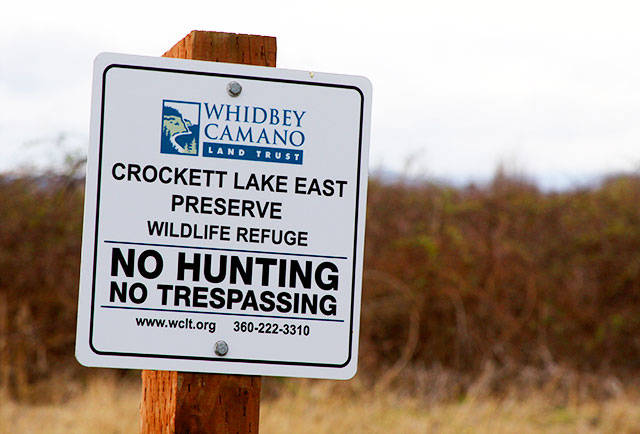For decades, residents near Crockett Lake on Central Whidbey have awakened to the sound of shot gun blasts in the predawn hours of fall and winter.
The blasts, normally heard on weekends, are a jolting reminder that it must be duck hunting season.
A recent land purchase by the Whidbey Camano Land Trust, however, is expected to make waterfowl hunting seasons much quieter around Crockett Lake.
In December, Whidbey Camano Land Trust acquired two properties, totaling 100 acres, from private landowners.
One of those pieces, an 85-acre parcel on the northeast corner of the lake, was used by hunters for years as a popular access point to the lake as well as a place to park a vehicle from October until January.
The land was owned by the Henny family, requiring permission from the landowner to hunt there.
The acquisition of the land by the Whidbey Camano Land Trust now makes it part of the nonprofit group’s 423-acre Crockett Lake Preserve, where the focus is to protect the scenic property as well as the more than 230 bird species that are found there.
Since Crockett Lake is located along the Pacific Flyway and is designated an Important Birding Area by Washington Audubon, the land trust prohibits hunting on its preserve.
Through federal and state grants and private donations, the land trust has purchased roughly 275 acres around Crockett Lake since 2015, leaving only a sliver of remaining private land where duck hunting is still possible for landowners or their guests.
The developments threaten to end a duck hunting tradition at Crockett Lake that dates back more than a century.
Crockett Lake was considered one of the last prime places on Whidbey Island to hunt for ducks, presuming you got consent from a landowner.
“I’ve dealt with land trust people before,” said Oak Harbor resident Brandon Bahr, who has hunted for ducks at Crockett Lake for about six years.
“Once they get a hold of those areas, they pretty much make it impossible for you to hunt.”
Bahr said he had always gotten approval from a landowner before venturing out to hunt on the lake.
The north side of the lake was the predominant hunting grounds because the south side is almost entirely owned by Washington State Parks, which prohibits hunting on its lands.
The land trust now owns the majority of the property that covers the northern half of the lake after purchasing 168 acres from Seattle Pacific University in 2015 and the latest additions.
Jessica Larson, a land steward with Whidbey Camano Land Trust, started notifying hunters in late December about the recent land purchases and that they would not be able to continue hunting on the preserve.
She said some people told her they had hunted there for generations. One told her his grandfather taught him to hunt there.
“They were definitely not happy but they did understand the big picture of wanting to have it protected,” Larson said.
The grants and donations the land trust received were driven by the land trust’s promise to establish a preserve that would protect the wetlands and the wildlife that inhabit them.
Hunting just didn’t mesh with that goal.
“We have to do justice to the grants and donors,” Larson said.
Larson, who’s fished and hunted herself, said she could empathize with waterfowl hunters, understanding that most will have to hunt off-island for ducks. Many go to Skagit County.
In some cases, the land trust has provided opportunities for hunting on its lands, Larson said. She pointed to the Trillium Woods on South Whidbey as an example. A deer hunting season is offered there.
But shooting birds in a nature preserve doesn’t really add up, she said.
A year ago, “no hunting” signs were posted around the nearby Crockett Lake East Preserve, which is made up of wetlands frequented by waterfowl.
Last month, the land trust had a lengthy split-rail fence installed along a portion of Wanamaker Road, blocking vehicle access to a popular parking spot and lake access point used by hunters on the former Henny property.
Deep ruts from vehicles can still be seen in the field there.
If grant funding comes through, a bird viewing platform could be installed there in the future, Larson said.
Four duck blinds ultimately will be dismantled on the lake’s north side, she said.
Bahr thinks it’s a shame.
“If you come here as a young sailor or a civilian, your options for being able to hunt on public lands around here if Crockett is taken away are pretty much gone,” Bahr said.
In reality, access had already been reduced to private lands contingent upon landowner approval with one tiny exception.
Larson said there is a small piece of property on Crockett Lake not far from the Coupeville ferry terminal that provides public access to waterfowl hunting.
The land is owned by the State Department of Natural Resources, she said.
She still suspects hunters will arrive at the Crockett Lake Preserve in the fall.
“It will still be an education piece,” Larson said.



